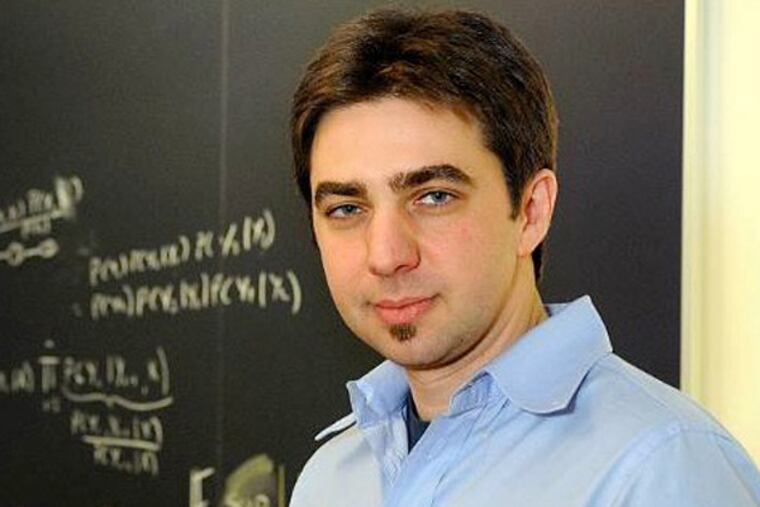Ben Taskar, 36, former Penn wizard
Fernando Pereira was recently trying to organize a session at a forthcoming computer science conference about the work of Ben Taskar, a former University of Pennsylvania associate professor who died of an apparent heart attack Nov. 17.

Fernando Pereira was recently trying to organize a session at a forthcoming computer science conference about the work of Ben Taskar, a former University of Pennsylvania associate professor who died of an apparent heart attack Nov. 17.
There was just one problem.
Though he was only 36, Mr. Taskar enjoyed a career so full of highlights it was almost impossible to choose from among them, said Pereira, a former Penn faculty member who is now a research director at Google.
"He is one of maybe the most creative people in the field in his generation," Pereira said. "I fear I will not see the likes of him again in my life."
Mr. Taskar, who was at Penn from 2007 until leaving for the University of Washington this year, was a prominent researcher in a field called machine learning.
A key focus of his work was training computers to search through reams of photos and videos for specific objects or actions - say, a person opening a door or throwing a ball, or even a specific facial expression.
Currently, most computer search functions work by searching for textual tags, or labels, associated with an image. Mr. Taskar trained computers to look for the image itself by giving them lots of examples of the object or action in question.
Another way he "taught" the computer how to search for images was to provide it with both the video and transcripts from TV shows such as Lost and CSI.
Colleagues said Mr. Taskar was a rare combination of talented researcher and gifted teacher.
When Mr. Taskar started teaching an advanced course in machine learning at Penn, it was more difficult than the university's previous version of the course, and some students had trouble, said Jianbo Shi, an associate professor of computer and information science at Penn.
So Mr. Taskar redoubled his efforts, creating online videos, adding teaching assistants, and extending his office hours to ensure student success.
"The amounts of things he does, most people would be burned out," Shi said. "I've never seen someone work so hard and be so cheerful at the same time."
Mr. Taskar also worked with colleagues on technology to assist disabled children, inspired by his own daughter, Aviv, 2, who suffers from a rare condition called spinal muscular atrophy-1.
Aviv can barely move her arms and legs, so Mr. Taskar was working to develop a robotic device that she could operate with eye movements, said Kostas Daniilidis, a Penn professor of computer and information science. Colleagues plan to continue the research.
A memorial service is scheduled for 3 to 4:30 p.m. Monday, Dec. 2, in the Wu and Chen Auditorium in Penn's Levine Hall. A ceremony also was held Nov. 22 in San Francisco.
In addition to his daughter, Mr. Taskar is survived by his wife, Anat Caspi; his parents, Mark and Tsilya Taskar of San Mateo, Calif.; and his sister, Alina Beyer, also of the Bay Area. A fund for his daughter's medical care has been established at www.bentaskar.com.
215-854-2430